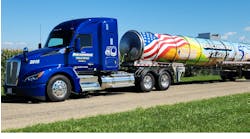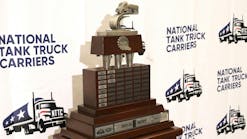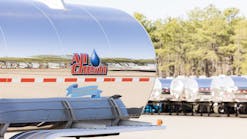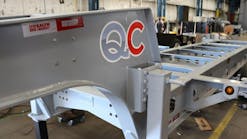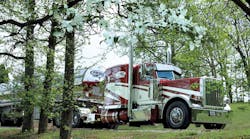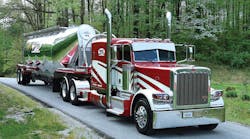First Class Services strives to meet or exceed customer expectations with every load
THE COMPANY slogan is “Our Name Says it All,” and it clearly does.
Everyone at First Class Services Inc is dedicated to meeting or exceeding customer expectations with each and every load. The goal is to deliver every load safely and on time without exception.
Meeting this objective is a top-down effort and has been since the Lewisport, Kentucky tank truck carrier hauled its first load in 1989. Today, the carrier serves an increasingly diverse customer base with a fleet that includes more than 100 tractors and 225 tank trailers.
“Our passion to provide first class service has been a winning strategy,” says Randy Stroup, First Class Services president and chief executive officer. “Customer satisfaction is the keystone to any successful business. The caliber of service we provide our customers absolutely makes us stand out from the competition. Delivering outstanding service includes being able to anticipate and react to customer emergencies.
“Business is good, and we believe it will continue to get better. We expect to grow by as much as 20% this year. Other factors contributing to our optimistic outlook include the driver shortage and increased customer demand for transportation. More plastics production capacity is coming on line, and we believe the plastics market will continue to grow with the US economy.”
Stroup started First Class Services with his brother Willie, and their initial focus was on propane and anhydrous ammonia. Willie left in 2005 to start his own tank truck carrier—Time Dedicated Carriers (Time D.C.) in Rockport, Indiana.
Randy had been driving a truck since he was 18 and had spent five years as a lease operator for Southern Pride Trucking in San Diego, California.
“I gained valuable experience transporting commercial jet engines on step-deck trailers for David Hodgeman’s Southern Pride Trucking operation,” he says. “I learned about the importance of customer service and how to deal with strict regulations relating to the cargo I was hauling. My brother and I transferred David Hodgeman’s principles of customer service to the tank industry.
“David Hodgeman also taught the value of running attractive fleet equipment. Equipment appearance is a service factor. After all, we represent the customer’s product.”
Family ties
The brothers also modeled their operation on Farmers Oil Company, a tank truck carrier started by their uncle, Ray Graves, in Anthony, Kansas. The fleet is now owned by Graves’ son Larry.
In business for more than 40 years, Farmers Oil Company is a full-service carrier that specializes in the hauling of liquid petroleum gas products, liquid fertilizers, anhydrous ammonia, casing head, cement, produce, and many other products.
“From our uncle, we learned a lot about handling liquid and dry bulk,” Randy says.
From propane and ammonia, First Class Services quickly expanded into plastic pellets. Randy made a quick run to Kraft Equipment in Kansas City, Kansas in late 1989 to pick up a 1,585-cu-ft Heil dry bulk trailer to handle the first load of plastics. By 1997, the carrier was operating about 50 pneumatic bulkers, as well as a few more MC331 propane/anhydrous ammonia tanks.
Diversification into chemical hauling started with the shutdown of Matlack Systems Inc in 2001. First Class Services hired a number of Matlack employees from terminal locations in Calvert City and Owensboro, Kentucky. The carrier also purchased about 30 tank trailers from Matlack Leasing. Chemical hauling continues to grow, and the carrier has become a Responsible Care Partner.
Operating area
Today, the First Class Services fleet operates across the 48 contiguous United States and has equipment dispersed among five locations, including the Lewisport home location. The other fleet locations are Owensboro and Louisville, Kentucky; Evansville, Indiana; and Columbia, South Carolina.
“We have equipment and drivers spread out from the Gulf Coast to the North East,” Randy says. “We’re looking to add a terminal in the Gulf Coast region, and we will do that over the next year. We want to develop a full-service terminal with a wash rack.”
The carrier divides operations into two categories—regional and system wide. System wide traffic is dispatched from the Lewisport headquarters office, while regional activities are directed from the local terminals. Dispatch operations are managed with the McLeod fleet management system. Average length of haul is over 300 miles.
Increasingly, the carrier is using technology to provide customers with customized shipment tracking and reporting. “We have embraced technology to be more efficient, process paperwork faster, and pay drivers quicker,” says Cessilee D Stroup, vice-president of First Class Services. “Our Omnitracs on-board computers have in-cab scanners that enable our drivers to submit documents electronically.”
While most loads are handled by the First Class Services fleet, family connections to Time D.C. and Farmers Oil Company provide distinct competitive advantages. “Between our fleets we have 300 tractors and 540 tank trailers,” Randy says. “We share equipment to handle increased spot demand, which gives us more flexibility and creates opportunities. We also share logistics strategies.”
Driver recruiting
To date, First Class Service has enjoyed good success in attracting the drivers needed to keep the fleet rolling. “We’re a people company, and we have great respect for our drivers,” Randy says. “I’m also a truck driver, so I know what it’s like on the road. Too many fleet managers today lack hands-on experience and knowledge.”
Company drivers predominate in the First Class Services operation, but the management team is giving greater thought to owner-operators. “We have added some owner-operators, and we believe they may give us the opportunity to expand more rapidly and enter new markets more cost effectively,” Randy says.
He adds that owner-operators could be a great fit for the system-wide side of the business. “We let the system drivers stay out as long as they want, and four weeks at a stretch is typical,” Randy says. “This side of the operation generates the biggest paychecks, but many of today’s drivers don’t want to stay out that long.”
The carrier prefers drivers with at least five years of over-the-road experience and at least some time with tank trailers. Important selection factors include a stable work history and a record of safe driving.
“We want to select the best drivers in the industry, and that is one reason we try to recruit organically,” Stroup says. “By making our drivers happy, they bring in more of the good drivers.”
Fleet attraction
An attractive fleet also helps recruit some of the very best drivers. First Class Services has built a strong image profile by competing in a number of regional and national competitions with a series of show trucks, including: First Gear (a 2005 Peterbilt), First in Class (a 1986 Model 359 Peterbilt), and X-Factor (a 2006 Model 379X Peterbilt). Overall, the fleet has received 54 awards for safety, customer satisfaction, and equipment appearance.
Every tractor and trailer in the fleet looks almost as good as the show trucks. Tractors and trailers stand out with distinctive paint schemes and decal treatments. The signature enhancement on tank trailers is what drivers call “The Fireball.”
“This ring of amber and red LED lights around the tank heads is very visible at night,” Randy says. “It’s our trademark.”
The newest tractors in the fleet are Peterbilt Model 389 long-nose conventionals with 63-inch mid-roof sleepers. Auxiliary power for the sleeper comes from a Nite System battery array. Safety equipment includes Rosco video cameras provided through Energi, the carrier’s insurance provider.
Tractors are specified with Cummins ISX engines rated at 550 horsepower, 18-speed Eaton Fuller Transmissions, and the Peterbilt Flex-Air drive suspension. Aluminum fifthwheels are from SAF Holland. Michelin tires are used on all of the fleet equipment.
About 45% of the trailers in the fleet are dry bulkers or pneumatic self-loaders built by Tremcar, Mac, and J&L Tank. With capacities ranging from 1,625 to 1,650 cubic feet the newest four-hopper trailers are spec’d for plastic pellets.
All of the product-handling hardware is from BTI. Twenty-inch domelids are from Knappco. Grote lighting is standard. Dry bulkers have Hendrickson Intraax air suspension/axle systems and Tiremaax tire inflation management. Safety equipment includes Meritor-WABCO antilock braking.
Mississippi Tank Co built the newest MC331 tanks used for propane and anhydrous ammonia. The 10,600-gallon pressure vessels are designed with a 265-psi capability. Hardware includes Fisher valves and Blackmer pumps powered by a jackshaft off the tractor PTO.
For chemical hauling, the carrier uses DOT407 stainless steel trailers from Tremcar, Polar Tank, and Heil Trailer. The 7,000-gallon single-bore tanks are insulated and heated. Hardware includes Fort Vale pressure-/vacuum-relief valves. Product hoses are from Hosemaster.
A skilled team of trained service professionals and maintenance technicians at all terminal locations keeps the fleet in top running order. The shop has the capability to rebuild tractors from the ground up.
“Our fleet and our driver force give us the resources to ensure safe reliable transportation for every product shipped by our customers,” Randy says. “We built a first class reputation by providing first class service every day, 365 days a year.” ♦

